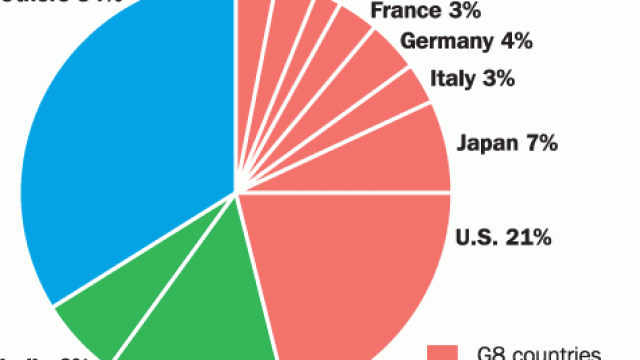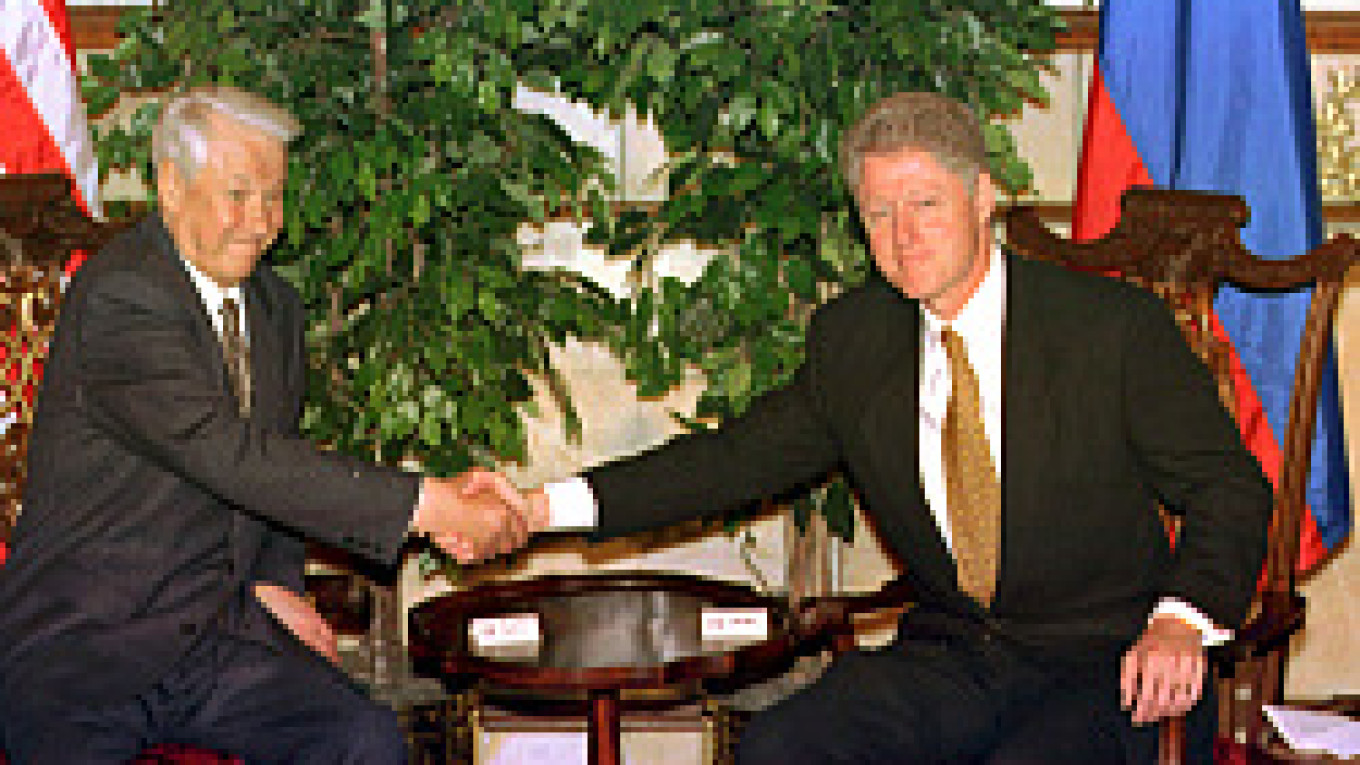Especially since Russia's accession, the G8 has become more of a political organization than the grouping of economic powerhouses it began as. President Vladimir Putin will host G8 leaders in St. Petersburg in July for talks focusing on such varied topics as energy security, education and combating infectious diseases.
The first meeting of what would become the G8 took place in 1975, when French President Valery Giscard d'Estaing invited the leaders of Britain, Germany, Italy, Japan and the United States for talks at Rambouillet. In the wake of the oil crisis, the six leaders gathered to discuss economic, financial and monetary issues. Canada joined the group the next year, making it the G7.
The G8 door was opened to Russia thanks to politics as much as to economics. Its entry was based on a Western desire to encourage Russia to pursue democratic and market reforms, rather than Russia's economic prowess.
Today, the Russian economy is only the world's 10th largest -- behind India, China and Brazil, though bigger than that of G8 member Canada.
In the last year of the Soviet Union, Mikhail Gorbachev attended the 1991 summit as an observer, meeting G7 leaders on the sidelines, and Yeltsin was a guest in 1992 and 1993.
Russia's involvement with the G7 expanded as Western leaders, especially U.S. President Bill Clinton, sought to integrate the new Russia into the world economy. At the 1994 summit in Naples, Russia was for the first time allowed to participate in the political discussions, part of the Clinton administration's strategy to pull Yeltsin Westward. This group became known as "G7 Plus 1."
The United States was the primary force behind the push to offer Russia full membership as a reward for its acquiescence to NATO expansion into former Soviet satellites. Russia was first treated as an equal during the "Summit of the Eight" in Denver in 1997, when NATO's push into the Baltic states and Poland was under way. The 1998 summit in Birmingham, England, marked the official creation of the G8, with Russia becoming a full-fledged member.
While Russia was offered membership as a carrot, some in the West have suggested using it as a stick, demanding that it be revoked over Moscow's policies on business and on human rights.
In February, a task force for the U.S. Council on Foreign Relations encouraged reviving the G7 within the G8 due to Russia's human rights record. "Even with Russia's inclusion in the G8, the G7 has continued to meet to discuss certain financial issues; selected political questions now require a similar format," the group said.
Amid the mounting criticism and the European jitters about energy security, Putin in February apparently felt compelled to defend Russia's role in the G8, signing his name on an article that was carried by several major newspapers worldwide. The article laid out the priorities of Russia's presidency and also sought to establish Russia's importance to the G8 as a guarantor of global energy security.
Russia is hoping that its role as an energy supplier means its seat is secure. "We are as necessary to the G7 as they are to us," presidential aide Igor Shuvalov said before last year's G8 summit. "We are prepared to guarantee stable energy supplies to our partners to secure their stable development for decades ahead."
Should Russia Be in the G8?
NO
Relatively Small Economy
"Russia is not one of the world's leading economic powers -- the original and still most important criterion for membership. Its influence on global affairs has declined to near insignificance."
-- Bobo Lo, former Australian diplomat and Russia expert at London's Royal Institute of International Affairs, July 2005
Drift Away From Democracy
"Under Mr. Putin, Russia today is neither a democracy nor one of the world's leading economies, and I seriously question whether the G8 leaders should attend the St. Petersburg summit...The United States and our European allies should start out by saying 'Vladimir, you're not welcome at the next G8 summit'."
-- U.S. Senator John McCain, February 2006
"Under President Putin, power has been centralized and pluralism reduced in every single area of politics. As a result, Russia is left only with the trappings of democratic rule -- their form, but not their content,"
-- Report by the U.S. Council on Foreign Relations, March 2006
Corruption
"[Corruption] was a big problem when I lived here 10 years ago, and it seems like a much bigger problem today. It's not a good sign that a society as rich in human and natural resources as Russia should let itself be lumped together in corruption rankings with small, impoverished countries like Albania and Sierra Leone."
-- U.S. Ambassador to Russia William Burns, March 2006
In 2005, Russia dropped to position No. 126 out of 159 in Transparency International's global corruption ranking. It is Russia's lowest ranking since 2001.
Poor Record on Human Rights and NGOs
By attending the G8 summit this July in St. Petersburg, Western leaders will be giving a strong stamp of approval to policies that include "the nationalization of private property, destruction of the rule of law, violation of human rights and liquidation of democracy."
-- Andrei Illarionov, former adviser to Putin, March 2006
YES
Vast Energy Resources
Under Putin, Russia has increased exports of oil and oil products from under 3 million barrels per day to 7 million bpd, becoming the world's biggest energy exporter.
"Russia is president of the G8 today because it more than doubled oil exports under Putin. No other country has added so much extra energy to the world in the last five years."
-- Chris Weafer, Alfa Bank chief strategist and former OPEC adviser, March 2006
Nuclear Security
"Can anyone think how nuclear security problems can be solved without the participation of Russia, a key nuclear power? Let them talk. ... A dog barks, but the caravan moves on."
-- President Vladimir Putin, January 2006
An Emerging Global and Economic Power
"The world is changing. Russia has demonstrated its potential to play a full and meaningful role in addressing the global problems that we all face."
-- G8 statement, 2002
"Russia has entered the G8 because of its political potential, and I'm absolutely convinced about the country's economic potential,"
-- Finance Minister Alexei Kudrin, September 2005
Reforms Under Putin
Russia's full membership in the G8 is "a very strong message of support for President Putin and his reforms in Russia."
-- British Prime Minister Tony Blair, June 2002
Russia's membership in the G8 "reflects the remarkable economic and democratic transformation that has occurred in Russia in recent years, and in particular under the leadership of President Putin."
-- G8 statement, 2002
No Fixed Membership Criteria
"This club doesn't have any rules. You can view it as you like -- full membership or not."
-- Deputy Finance Minister Sergei Storchak, November 2005
"No one is against our active participation in this club. No one wants the G8 to become a gathering of fat cats."
-- President Vladimir Putin, January 2006
Share of World GDP

Source: 2005 data from CIA World Factbook
| |||||||||||||||||||||||||||
A Message from The Moscow Times:
Dear readers,
We are facing unprecedented challenges. Russia's Prosecutor General's Office has designated The Moscow Times as an "undesirable" organization, criminalizing our work and putting our staff at risk of prosecution. This follows our earlier unjust labeling as a "foreign agent."
These actions are direct attempts to silence independent journalism in Russia. The authorities claim our work "discredits the decisions of the Russian leadership." We see things differently: we strive to provide accurate, unbiased reporting on Russia.
We, the journalists of The Moscow Times, refuse to be silenced. But to continue our work, we need your help.
Your support, no matter how small, makes a world of difference. If you can, please support us monthly starting from just $2. It's quick to set up, and every contribution makes a significant impact.
By supporting The Moscow Times, you're defending open, independent journalism in the face of repression. Thank you for standing with us.
Remind me later.


